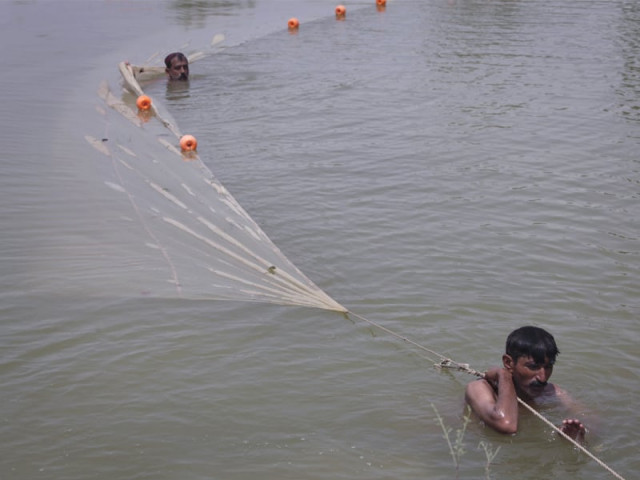Fishy business: Influentials hold inland fishing sources despite law
Around 300 water bodies are occupied illegally across Sindh.

Fishermen use a net to catch small fish from stranded waters which they sell to fish farms in the village of Machi Bundo near Sukkur. Even though the government has passed a law against it, influentials continue to hold inland fishing sources. PHOTO: FILE
It has been years since the Sindh Fisheries Amendment Act, 2011, was enacted, its implementation, however, remains elusive to the advantage of a few.
The law was framed chiefly to end the contractual system that benefited only a few feudal and political lords but it has yet to be implemented. To this day, fishermen remain at the mercy of their local lords. At a seminar titled ‘Implementation of Law for Abolition of Contract System’ on Monday, the speakers described how the old system of dominance by a few, to the detriment of many, persisted in a modified form.

“The 2011 amendment although did away with the old lease system that gave whole water bodies [canals, lakes, etc] to individual contractors but still illegal occupation by former contractors and influential people continues,” said Muhammad Ali Shah, the chairperson of Pakistan Fisher folk Forum, which organised the event.
Fishing figures
Around 300 water bodies, including the river, canals and lakes are illegally occupied by influential people across the province. “There are around 1,209 water bodies in Sindh, according to the fisheries department record but 200 to 250 of them have dried up,” Shah added.
Quoting the official figures, he said the annual production from this inland fishing stood at around 185,000 tons per annum while the marine fishing is far higher with 485,000 tons a year. “The estimated revenue generated from inland fishing is in billions of rupees every year but the fishermen are deprived of taking due share from it,” Shah said, adding that the provincial government collects only paltry taxes from it. According to him, only Rs17.5 million were collected in taxes last year.
The law
Under the law, the Sindh Fisheries Department issues licences not leases to an individual fisherman. This law allows fishermen to use only one boat per licence for fishing through the year, except for the time when fishing is banned across the province due to environmental reasons.
The fisheries deputy director, Ghulam Mujtaba Wadhar, while addressing the seminar, was unable to share figures of the licences issued. Wadhar said the fisheries official in every district take action against illegal activity and register cases against the suspected offenders. Despite all his claims, he failed to share the details of the cases registered so far.
Fishermen’s concerns
“We continue to live under the threat of the influential people that if we dare fish in the waters, our families will face the consequences,” said Muhammad Hussain Mallah, a fishermen from Hamal lake in Qamabar-Shahdadkot district. He maintained that even if fishermen can get licences they will be of no use because the people occupying the water bodies will never let them fish.
“There are 20,000 to 25,000 fishermen living around the water bodies, which are under illegal occupation of some 300 to 400 influential people and the earnings, which should be shared by these thousands of fishermen are snatched by these handful of bullies,” says Hussain Mallah, who hails from Togachi lake in Sanghar.
Advocate Sattar Sarki who has previously fought numerous cases on behalf of the fishermen, blamed the government for failing to implement the law. He said the poor fishermen feel too frightened and face lack resources to start litigation against the influential people. “The department should put in place an effective monitoring system so that anyone indulging in illegal activity is booked under the law,” he suggested. Sindh Agriculture and Forestry Workers Organisation’s Suleman G. Abro pointed out the issues in accessing markets, getting a fair price of their catch and about curbing exploitation by the middlemen.
Published in The Express Tribune, September 25th, 2013.



















COMMENTS
Comments are moderated and generally will be posted if they are on-topic and not abusive.
For more information, please see our Comments FAQ